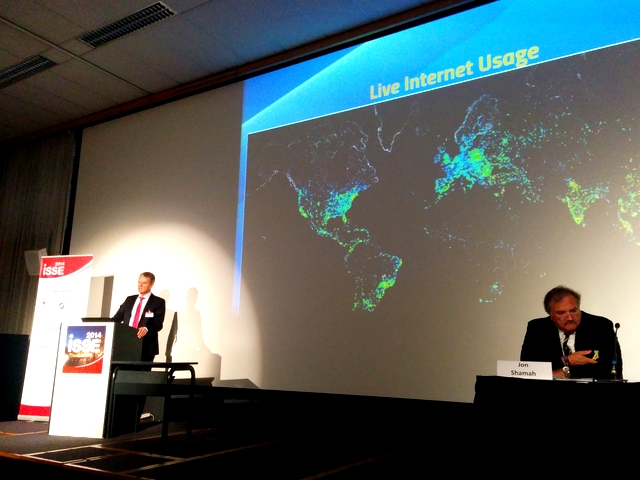
We are in Brussels at the 27th annual Information Security Solutions Europe Conference (ISSE), one of Europe's largest gatherings of cyber security experts.
Troels Oerting of the Danish police gave a fascinating opening keynote defending the right of the police to use surveillance over the Internet. It certainly ruffled some feathers in Brussels, but here are some of the highlights so you can make up your own mind.
 At the moment I'm taking a lot of flak from privacy people on the Internet, because I want police and law enforcement to have access to people's data on the Internet.
At the moment I'm taking a lot of flak from privacy people on the Internet, because I want police and law enforcement to have access to people's data on the Internet.
I know this is controversial. We all live in European countries, and you might have a government you trust, who gives you rules about how you live in the world.
We also give our government the right to interfere in our basic rights to freedom, to private ownership or free speech, so that when police see someone committing a crime, we can act. So when I acted in the Danish police, I could arrest them and deprive them of freedom. I could also use violence against people -- I had a baton, and pepper spray. And of course ultimately I was able to actually kill people if I deemed it necessary.
I could put bugs in people's homes, and use surveillance. These are the rules we have in the real world, and if we didn't have them, people wouldn't act in the way we want them to. If there were speed limits on the motorways, but no police to enforce them, would people follow the speed limits? Of course not. Some would, of course, but most would not.
I want you to imagine a world where a car was going too fast, but because there was no law about having number plates on your car, and the police are unable to identify the car. Or what about if we knew there was a ton of cocaine in a house, but because of a special kind of door and lock, we were unable to get inside. The criminals could just be watching us as we try. In that world, it's not law or reason that would be in charge, but the strongest people. That's the world I'm afraid of.
If civilians want intelligence services to stop spying on them, they will fail. They're better than we are, and they'll find a way.
As for the four billion people on the Internet, I think they have no idea what they're getting into, or what's out there. Someone has to protect them. And if you can't trust your police or your government, you should vote them out. Because if you can't trust them, you're only left with the strongest.
Cybercrime isn't a new kind of crime -- it's the same old crimes, now being facilitated by the Internet. Before, if you needed drugs or weapons or whatever, you might go to some bar in the city where you knew you had contacts. Now, you just order them on the Internet. And in the future, we'll see these things being delivered by drone. Why not? Why get yourself involved when you can just send a drone. Who can identify a drone? I can't, at least.
As more people get online, we'll get a wider attack surface, and because of this we'll see more crime -- and as more crime develops, we'll see fewer people getting caught for it. What we have to do is educate our citizens that they shouldn't share everything with everybody, which they currently do now. It's so easy for criminals to create an app that's full of malware and give it you for free. You have to learn: if you're getting something for free on the Internet, you're probably the product.
I think we all know that the third world war will begin in cyberspace. Of course we will still need soldiers. But at the outset infrastructure will go dark -- the television will go dark, the lights will go dark, and then the soldiers will come.
Right now, the vast proportion of cyber criminals are from the Russian world. It's a huge problem for us, and they're very, very skilled. We have to make it unattractive to be a criminal regardless of where you come from. We have to have a conversation about how to secure the Internet -- not for the tech savvy, not for you and me, but for my mother and father, my brothers and sisters, who just use it, and don't know what's waiting out there for them.
Published under license from ITProPortal.com, a Net Communities Ltd Publication. All rights reserved.

